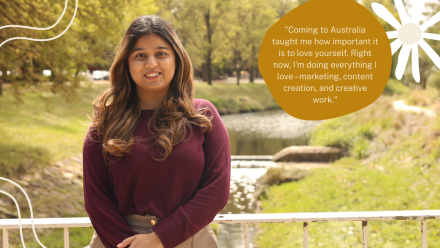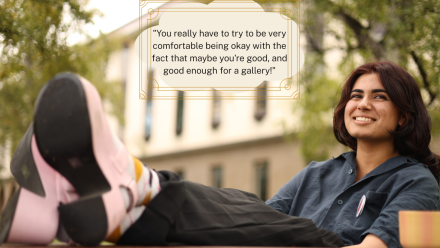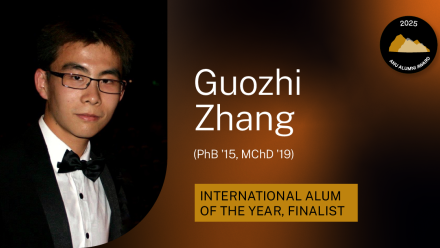Dr Rushika Wirasinha BMedSc (Hons) ‘08
I am always on the look-out for, and open to opportunities that may arise – you never know what might be around the corner so I find it’s good to keep an open mind…
Article written by Dr Alex Schumann-Gillett (PhD '19), from the ANU Women's Alumni Network.
The new Kambri precinct at the heart of ANU is uncharacteristically quiet at the moment, with the COVID-19 pandemic impacting our work, study and travel patterns.
ANU Alumna Rushika Wirasinha (BMedSc (Hons) '08) remembers this space when it was Union court; the meet-up spot between lectures, tutorials and science labs she attended as her interest in the field of immunology developed. Now, in these COVID-19 times, Rushika comments that, "the entire community has had to very quickly develop an understanding of viral infections, and become armchair immunologists!"
Rushika currently works as an at the Australian Government Department of Health. Of her decision to study at ANU, Rushika says, "I went to school in Canberra, and so when it came to making decisions of what to do after Year 12, ANU was an obvious choice. A highly ranked, world class University with a great reputation, was right on my doorstep. Looking back at my 18-year old self, I don't think I realised just how lucky I was to stumble into such a great Institution. The decision to undertake a Bachelor in Medical Science was really based on my broad interest in many different aspects of 'biology' and 'health'."
"The first year of my degree was a good taste-test of a variety of subjects. One of the best things I remember about my ANU courses was the openness, willingness and enthusiasm of the tutors and lecturers to share their knowledge and experience.
Rushika's degree included a research placement, which allowed her to develop insight into academia. From that placement, she chose to undertake an Honours year at the John Curtin School of Medical Research (ANU) where she had first-hand experience of academic research. She says, "the education, networks and friends/colleagues from my ANU days really set me up for the things I went on to do, including my PhD at the Garvan Institute and Postdoc at Monash University. I have the strong research expertise at the ANU to thank for that exposure."
Rushika's work as an immunologist focused on understanding the genetic basis of autoimmune diseases, and the development and function of T cells. During her PhD and postdoc, Rushika led the study of a novel gene associated with multiple sclerosis and presented this research at numerous conferences, with financial support from travel scholarships. Her first-author publication on her PhD work was selected as Editor's Choice in the peer-reviewed journal Immunology and Cell Biology.
While having academic experience, Rushika has now taken a career pivot into Science Policy through her Fellowship, and says, "It's been pretty great to be part of a program championed by Australia's Chief Scientist Dr Alan Finkel. Day-to-day I get to develop new skills in policy, from providing advice through to the implementation of policies. My technical experience (from my research career) is also highly valued. At the end of the program I'll be continuing to work in my current team, in policy related to health and medical research". She says that, "my move from academic research to public policy is still a very new one, so I'm looking forward to learning much more from my colleagues in the Australian Public Service."
Rushika reflects that "I am always on the look-out for, and open to opportunities that may arise - you never know what might be around the corner so I find it's good to keep an open mind. You can probably tell that from the very start of selecting a degree in Medical Science that my career has been a series of opportunities that have presented themselves and I've tried to pivot and run with the new challenge."
"My future career decisions will be informed by actively pursuing opportunities that can drive significant improvement in priority health areas and achieve the best healthcare outcomes."
Thinking about how she will continue to drive her career, Rushika shares, "I've certainly learnt more from failure than success. The cliché saying that you learn from your mistakes is especially true in research. More experiments fail than succeed - but it's the process of identifying the anomalies and attempting to fix them, that gives great satisfaction. Wherever or whatever role you currently find yourself in, always do your best - I think I've learnt the most from becoming comfortable with the uncomfortable and seeing the opportunity in the challenge."
As we head into more uncertain times, one of the strategies that Rushika recommends to keep feeling empowered, particularly as a woman, is "I enjoy reading the autobiographies and insights of great leaders" One of my favourite reads is 'The Power of Introverts' by Susan Cain. It resonated with me that you don't need to be an extrovert or the most vocal to be an effective leader." Some of the recent female leaders stories I've enjoyed include Michelle Obama, Melinda Gates, and Tina Fey. Their stories demonstrate the importance of teamwork and perseverance.


